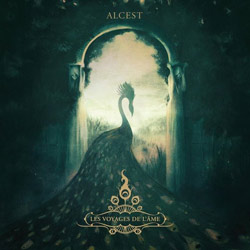
Les Voyages De L’Âme
Prophecy
Alcest has raised their public profile within the last year, going from cult status to a band that it seems most metalheads are talking about. (I’m sure their big US tour with Enslaved helped.) Well, here we are in 2012, and already Alcest has a new disc for our listening pleasure, Les Voyages De L’Âme. Musically, it is the logical next step in the band’s journey beyond black metal. Elements of shoegaze dominate, with cloudy, reverb-heavy guitars, contemplative melodies, muted vocals, and big, enticing choruses. As per usual, all the lyrics are in French so I have no clue what frontman Neige is singing about. And once again, Alcest has succeeded in turning the standard traits of black metal on its head; instead of using their tremolo-picked guitars and blast beats to create a grim mood, Alcest uses such devices to create music that is warm, romantic, and ultimately uplifting.
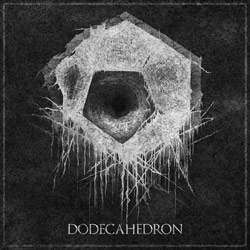
Dodecahedron
Season of Mist
Dodecahedron are relative newcomers to the post–black metal offshoot, but after listening to their eponymous debut album, I have a hard time really considering this disc actual black metal. Instead, it’s a spastic and rather unusual fusion of metal, math rock, free jazz and psychedelia that, save for the occasional blast beat, never really emphasizes any of those specific influences at any given time. It’s a dizzying 50 minutes of discordant guitar work, jagged song structures, and throaty vocals. At times, the album is more reminiscent ’90s Chicago avant-rockers US Maple than Darkthrone, while the fourth track, “Descending Jacob’s Ladder,” is basically a spoken-word piece set against a field of feedback, guitar noise and other electronic interference. While not every track on this disc will be an iPod favorite, Dodecahedron shows plenty of promise for future endeavors.
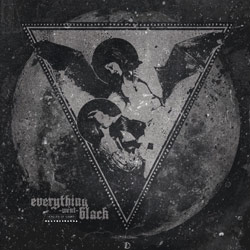
Cycles of Light
Prosthetic
St. Louis is one of the last places I’d expect to spawn quality metallic hardcore, but that is where Everything Went Black calls home. Their first disc for Prosthetic Records, Cycles of Light is a short but sweet record that runs the gamut from 1.5-minute long hardcore bashings to heady, drawn out excursions that wouldn’t be out of place on a late-period Black Flag record. (The band’s name is a reference to an SST compilation.) As such, Everything Went Black shows a good deal of diversity in musical ability and songwriting, and even uses a string quartet to outro one song, a bold move for such a typically stripped-down musical style. By no means has Everything Went Black reinvented this particular wheel, but there is plenty to like on Cycles of Light.
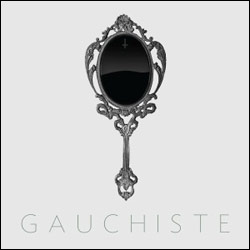
Gauchiste
Little Black Cloud
Save for the reissue of Sunn 0)))’s ØØ Void late last year, I’ve been starving for some abstract, ambient black metal to come my way, and American trio Gauchiste have swooped in to fill the void with their debut album, reportedly limited to a mere 100 vinyl copies and 100 compact discs, each furbished with handmade packaging and artwork. But I’m not here to review the boxes this thing comes in. Gauchiste’s self-titled debut is seven tracks of seemingly free-form, minimalist drone augmented by fleeting electronic blips, dark and woozy keys, ominous bells and gongs, occasional drum machines, cymbals and other percussion, cryptic spoken word segments buried deep in the mix, and in rare instances, distorted robotic vocals well-suited for a futuristic horror fantasy. Unlike many ambient metal releases, none of the tracks outstay their welcome. Gauchiste effectively creates an eerie environment in which shadows produce noise, rain never falls, and ghosts hover in the dark sky. Some listeners may dismiss Gauchiste’s music as mere soundtrack fare, but I think that is selling the group short, given their compositional talents and ability to create such a spellbinding musical world.

Dark Adrenaline
Century Media
I have been a huge Lacuna Coil fan for a long time. That is until they issued the dud of a disc Shallow Life in 2009. Everything about that album was wrong. The band was stripped of their gothic sound, and the record reeked of watered-down commercialization. Wisely, though, they downplayed most of those songs on their setlists when touring in recent years. So apparently cognizant of that misstep, Lacuna Coil has gone back to the drawing board for their new album, Dark Adrenaline. This record seems is the more logical successor to 2006’s Karmacode.
As per their wont, Lacuna Coil front loads the album with the best songs of the set, and so later into its 45 minutes, things get hit or miss. However, the guitars are crunchy throughout, the bass is prominent, and there are hooks aplenty to get most of these songs stuck in your head. For the most part, Cristina Scabbia sounds in top form, and Andrea Ferro puts in some of his better vocal performances to date, although they sound a little overprocessed. Lyrically, the band can get a little corny, but if you’ve been following Lacuna Coil for any length of time, you know this is to be expected. Also potentially off-putting is the band’s cover of REM’s “Losing My Religion,” but it’s a ballsy rendition and for the most part the group makes it work. Overall, Dark Adrenaline is immediately satisfying.
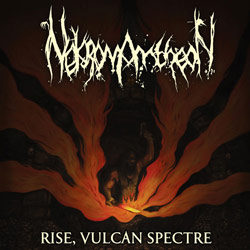
Rise, Vulcan Spectre
Indie
Last year saw the release of many quality thrash albums, but none of them really rocked my ass off. However, 2012 might be a different story given the release of Rise, Vulcan Spectre by Norwegian heshers Nekromantheon. Now, this is my kind of of thrash: dark overtones, catchy songs, galloping drums, larger than life riffs, lightning speed guitar work, and fiery rough-throated vocals. If I crank this one up, I’ll be more than happy to strap on my combat boots and annihilate everything in sight. This, my friends, is a good thing.
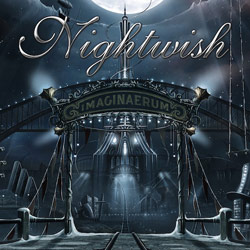
Imaginaerum
Nuclear Blast
Given my taste for symphonic metal with a female vocalist, I should be a huge Nightwish fan. But the reality is that Nightwish has always been hit or miss with me. However, the band’s newest opus, Imaginaerum, has surprised me as a somewhat bold effort creatively. The records shows a good deal of diversity song-for-song (instrumentals, pop, power-metal, ballads) and takes some chances musically, including the inclusion of a children’s choir, some Celtic motifs, violin solos, and orchestral interludes. All of these elements are paired up with the typical Nightwish hallmarks: fantasy-based lyrics (the album is actually the soundtrack to an upcoming full-length fantasy movie), keys, strings, brass, and the occasional acoustic guitar flourish. Indeed, there are a lot of sonic bells and whistles here to keep a listener’s attention, but in the end, Imaginaerum proves to be just as much substance as it is style.
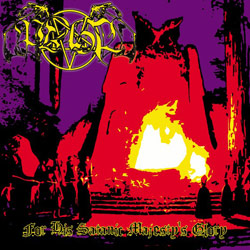
For His Satanic Majesty’s Glory
AiS/Wraith
For His Satanic Majesty’s Glory immediately jumps out, if for the blaring, bright colors of its cover art alone, but the Indiana-based duo of Ptahil has managed to weave a seamless fusion of black, doom and sludge metal. There is absolutely nothing fancy going on here, just raw, lumbering drums and fuzzy guitar chords coming straight for your psyche. The dual vocals of Mhaghnuis and Luathca work really well here, with one vocalist’s strained vocal chords sounding like they’re being strangled and the other vocalist coming off like a nasty, snarling troll. All of these elements combine effectively to make For His Satanic Majesty’s Glory a straight rocking affair.
Gary Spencer
EXTREMITIES
